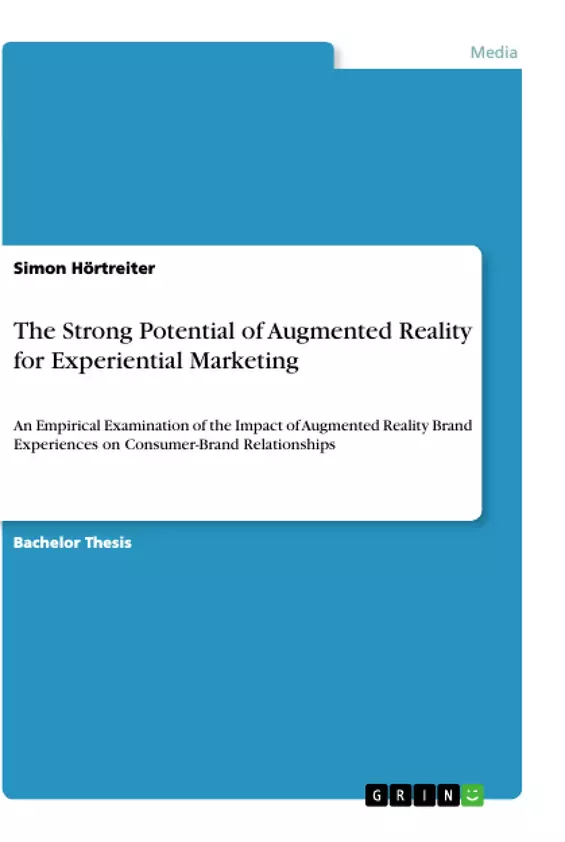As traditional marketing approaches are losing their effectiveness, brands have recently started to apply augmented reality (AR) for staging powerful brand experiences that will differentiate them from competition. However, despite proving an innovative way to captivate consumers’ attention, research within the field of AR brand experiences has been relatively scarce, resulting in reluctant adoption as marketers are unaware of the technology’s direct brand-related outcomes. Since several scholars indicate a possible connection between AR brand experiences and consumer-brand relationships, this thesis aims to extend the scarce literature and subsequently further entice adoption by examining the impact of AR brand experiences on consumer-brand relationships.
This study applied a mixed method research approach, consisting of a survey as the predominant method to assess the hypotheses as well as expert interviews to validate the quantitative results and gain further in-depth insights. The questionnaire sampled millennial consumers in Germany who recently encountered an AR brand experience. Overall, quantitative data analysis included exploratory factor analysis and multiple regression analysis for hypotheses testing, while a thematic analysis was applied on the gathered qualitative data.
The results of this thesis demonstrate that AR brand experiences have a positive impact on consumer-brand relationships. Furthermore, the key relationship drivers of AR were identified as sensory experiences incorporated through visualization and immersion, affective experience staged by storytelling and co-creation, as well as behavioral experiences crafted through location-based AR.
This thesis contributes further knowledge to the augmented reality marketing literature, consumer-brand relationship literature and experiential marketing literature, as well as suggests directions for future research. Moreover, the findings of this research facilitate marketers’ endeavors to successfully develop AR brand experiences that foster consumer-brand relationships.
Inhaltsverzeichnis (Table of Contents)
- 1. Introduction
- 1.1 Background
- 1.2 Problem Statement
- 1.3 Purpose
- 1.4 Structure
- 2. Literature Review
- 2.1 Experiential Marketing
- 2.1.1 Driver of Experiential Marketing: The Rise of the Experience Economy
- 2.1.2 Key Concept of Experiential Marketing
- 2.1.3 Brand Experience
- 2.1.4 Term Definition
- 2.2 Consumer-Brand Relationship
- 2.2.1 Conceptual Foundations
- 2.2.2 Measuring Consumer-Brand Relationships
- 2.2.3 The Attachment-Aversion Relationship Model
- 2.2.4 Consumer-Brand Relationship and Experiential Marketing
- 2.3 Augmented Reality
- 2.3.1 Augmented Reality Marketing
- 2.3.2 The Potential of Augmented Reality for Experiential Marketing
- 2.3.3 Prior Research on Augmented Reality Marketing
- 2.4 Conclusion
- 3. Methodology
- 3.1 Conceptual Model and Hypotheses Development
- 3.2 Research Approach and Design
- 3.3 Data Sources
- 3.3.1 Secondary Data
- 3.3.2 Primary Data
- 3.4 Data Collection
- 3.4.1 Expert Interviews
- 3.4.2 Survey
- 3.5 Measures
- 3.5.1 Independent Variable
- 3.5.2 Dependent Variable
- 3.6 Sample
- 3.7 Data Analysis
- 3.7.1 Quantitative Data
- 3.7.2 Qualitative Data
- 4. Empirical Findings
- 4.1 Quantitative Data
- 4.1.1 Demographic Characteristics
- 4.1.2 Reliability Test
- 4.1.3 Validity Test
- 4.1.4 Exploratory Factor Analysis
- 4.1.5 Multiple Regression Analysis
- 4.2 Qualitative Data
- 4.2.1 Visualization
- 4.2.2 Immersion
- 4.2.3 Storytelling
- 4.2.4 Co-Creation
- 4.2.5 Location-Based AR
- 5. Discussion
Zielsetzung und Themenschwerpunkte (Objectives and Key Themes)
This bachelor thesis examines the impact of augmented reality (AR) brand experiences on consumer-brand relationships. The study aims to contribute to the understanding of this emerging field, particularly focusing on how AR experiences influence consumer perceptions and engagement with brands. Through a mixed-methods approach, the thesis investigates the relationship between AR brand experiences and consumer-brand relationships. * **Key themes:** * The influence of augmented reality on experiential marketing * The relationship between AR brand experiences and consumer-brand relationships * The impact of AR brand experiences on consumer perceptions and engagement * The role of sensory, affective, and behavioral experiences in AR brand experiences * The potential of AR for fostering positive consumer-brand relationshipsZusammenfassung der Kapitel (Chapter Summaries)
* **Chapter 1: Introduction** * This chapter provides a background on the increasing use of augmented reality in marketing and outlines the problem statement, purpose, and structure of the thesis. * **Chapter 2: Literature Review** * This chapter presents a comprehensive review of relevant literature on experiential marketing, consumer-brand relationships, and augmented reality. It explores key concepts, theories, and existing research on the topic. * **Chapter 3: Methodology** * This chapter outlines the methodology used in the study, including the conceptual model, hypotheses development, research approach, data sources, data collection methods, measures, sample, and data analysis techniques. * **Chapter 4: Empirical Findings** * This chapter presents the findings of the quantitative and qualitative data analysis. It includes demographic characteristics, reliability and validity tests, exploratory factor analysis, multiple regression analysis, and thematic analysis. * **Chapter 5: Discussion** * This chapter discusses the findings of the study, exploring the implications of the results and their contributions to the field of augmented reality marketing.Schlüsselwörter (Keywords)
The core focus of this thesis revolves around augmented reality, experiential marketing, brand experience, and consumer-brand relationships. The study investigates the impact of AR brand experiences on consumer perceptions, engagement, and ultimately, their relationship with the brand. Key terms such as sensory, affective, and behavioral experiences are explored in relation to AR brand experiences. The study uses a mixed-methods approach, employing both quantitative and qualitative data analysis techniques such as exploratory factor analysis, multiple regression analysis, and thematic analysis. These keywords encapsulate the key areas of research explored in this thesis.- Citar trabajo
- Simon Hörtreiter (Autor), 2020, The Strong Potential of Augmented Reality for Experiential Marketing, Múnich, GRIN Verlag, https://www.grin.com/document/901013



